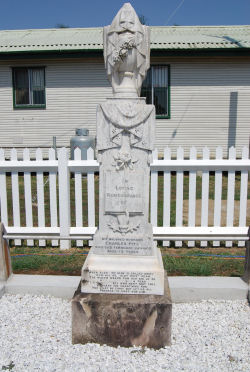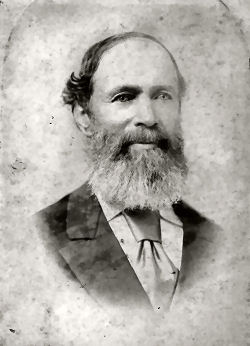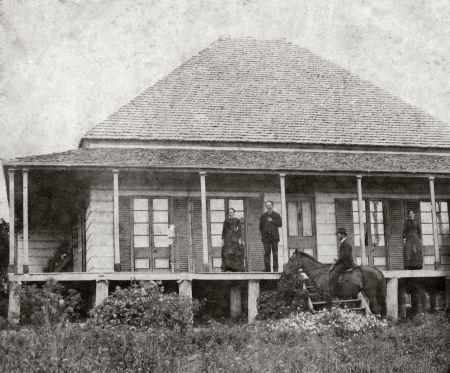|
For a much fuller account of the Pitt family story,
the reader is referred to: Brian Thomas Grenier,
Thomas and Mary Grenier: Brisbane
Pioneers—Supplement No. 1, June 2004, pp. 34-38
(available in the Thomas Welsby Library, RHSQ).
Charles Pitt
was the third son of Samuel and Ann (née Hutchins)
Pitt who were married on 30 May 1819 in St Peter’s
Church of England, Tiverton, Devon. The children of
Samuel and Ann were as follows: Samuel1
(1820-1831), John (1821-?), Roger (1823-1889), Mary
Ann (b. 1825; m. Frederick Augustus Francis in St
Andrew’s Church, Sydney, 22 March 1848; d. 20
January 1911, South Brisbane), Charles (b. 1827; d.
24 February 1903), Caroline Amelia (b. 14 June 1838;
m. James Schott at sea in 1869; d. 1879), Mary Jane
(b. 3 July 1839; m. Moses Walmsley 9 March 1855; d.
7 January 1918), Samuel2 (b. 2 October
1840; d. 29 February 1844) and Sarah Ellen (b. 1843;
m.1 Edwin Nutt in Victoria in 1859; m.2
William Hillier 17 June 1882; d. 1924).


Charles Pitt was the last of these children to be
born in Tiverton; the rest were born in Australia
after their parents settled here. He was a Cooper’s
Plains farmer at the time of his marriage to Mary
Ann Grenier—the oldest living daughter Thomas
and Mary (née Pannell) Grenier—on 24 January 1855.
According to the writer of Mary Ann’s obituary,
‘Their wedding was the first celebrated in the old
cathedral of St John’s, Brisbane’.
The first child of Charles and Mary Ann was born on
27 October 1855 and baptised in the old (i.e. the
second) St John’s, Brisbane. Named after her mother
and grandmother, Mary Ann Pitt was Thomas and Mary
Grenier’s first grandchild. Sadly she fell victim to
diphtheria and died on 15 July 1862, a few months
short of her 7th birthday. The grief of this child’s
death loss was compounded when another daughter,
Caroline Ellen Jemima (b. 7 April 1859) died just a
week later on 22 July 1862. This must have been a
traumatic experience, especially for the mother of
the family who gave birth to another girl, Eliza
Ann, before the month was out, on 31 July 1862.
The other children of what came to be a large family
were as follows: Charles Samuel Pitt (b. 16 January
1857; d. 12 January 1858), Charles George Pitt (b.
25 November 1860), Edwin Samuel Pitt (b. 15
September 1864), Frederick Ernest Pitt (b. 14 March
1868), Thomas Roley Pitt (b. 16 August 1871; d. 5
March 1872), and Sarah Ellen Pitt (b. 6 September
1873, known as Ellen).
In view of his knowledge of Redbank Plains and of
his commercial experience as a cotton grower,
Charles Pitt was called before a select committee of
the Queensland Parliament on Monday, 27 February
1871 in connection with the proposed new railway
link between Ipswich and Brisbane. Asked what he had
under cultivation, he replied: ‘Cotton, except just
enough corn and hay for my own use; I have about
seventy acres under cotton’. He added that all his
hay was cut by scythe and not by mechanical means.
Given the difficulties of taking 300-lb. bales of
cotton to Ipswich by horse-drawn drays or by steamer
(a distance of 7 miles), he indicated that he
favoured a rail service. Charles spoke with some
authority; for, as he observed: ‘I have been on
these plains myself, for fifteen years nearly, and
am the oldest inhabitant upon it’.
Charles Pitt passed away on his property at Woogaroo
(Goodna) on 24 February 1903 at the age of 75, a
victim of heart disease, and was buried in the
‘Oxley Cemetery’ (God’s Acre) on the following day
after a service conducted by the Methodist minister,
the Reverend William Little. GAS (?) Drew Jr and
Charles George Pitt were the official witnesses to
the burial. According to Charles’s death
certificate, the only children still alive at the
time of his demise were: Charles George (aged 42),
Edwin Samuel (37), Frederick Ernest (34) and Sarah
Ellen (29).

Charles Pitt
The following biographical entry on Charles Pitt
appears in The Aldine History of Queensland
(1888):
CHARLES PITT, J.P., Farmer and Grazier, was the
second purchaser of land in this district [Redbank
Plains], and was unquestionably the second to
introduce the cotton industry, for the successful
establishment of which he received a sum of £400
from the Government. He was born at Tiverton, Devon,
in 1828 [or 1827?], and when eight years of age
accompanied his parents to Sydney, and thence to
Tasmania, where he was educated. He next went to
Geelong, Port Phillip, and there acquired his first
experience of station life. Returning to Sydney,
where his father died, he made his way to Ipswich,
and went into hotel keeping, afterwards becoming
storekeeper on a station in the Burnett district. In
1850 he returned to Brisbane, and purchased his
first farm at Oxley, which he retained for five
years, at the same time having secured a grazing
area at Redbank Plains. In 1855 he married the
daughter of Thomas Grenier [Mary Ann], settled in
this district, and commenced the cultivation of
cotton, as before stated. He has now about 195
acres, 100 of which are under maize crop. On this
estate he has also successfully grown cane sugar.
Mr. Pitt is a large property owner in Brisbane,
where he has twelve houses. He has been a Magistrate
for many years, and was the first chairman of the
Purga Divisional Board, upon which he has sat, with
the exception of one year, ever since its
inauguration. He gives earnest support to every
measure for the progress of the district, and the
inhabitants are indebted to him for many
improvements in their roads. In the cause of
education he has done some good service, and has
been chairman of the local School Board for many
years.
In 1881 he made a tour of the
colonies with his wife. They have three sons and two
daughters, and belong to the Primitive Methodist
Church.

Charles and Mary
Pitt at Rosehill Farm Redbank
The Ipswich-based newspaper, the Queensland Times,
celebrated Charles’s life in the following obituary:
A REDBANK PLAINS correspondent writes:—It is my sad
duty to chronicle the death of Mr. Charles Pitt,
whose death took place at Goodna on Tuesday last. He
was laid up for only a few days, the cause of his
demise being blood-poisoning. He was born at
Tiverton, Devonshire, in 1828 and when eight years
of age accompanied his parents to Sydney, and from
there to Tasmania, where he was educated. He next
went to Geelong, Port Phillip. Returning to Sydney,
where his father died, he made his way to Ipswich,
and thence to the Burnett district, where he gained
a knowledge of pastoral life. In 1850 he returned to
Brisbane, and purchased his first farm at Oxley,
which he worked for five years, at the same time
having secured a grazing area at Redbank Plains. In
1855 he married the daughter of Mr. Thomas Grenier,
of South Brisbane, settled in this district, and
commenced the cultivation of maize and cotton. He
received £400 from the Government for the successful
establishment and introduction of cotton-growing. He
was the first chairman of the old Road Trust as well
as the first Chairman of the Purga Divisional Board.
He always gave his earnest support to everything
tending to advance the interests of the district.
Mr. Pitt, like all the old residents, had a great
deal of uphill work, but manfully overcame all his
difficulties. He was universally esteemed by all
classes for his broad-minded and thoroughly honest
principles. To use a colonialism “he was a straight
goer,” and never uttered a word behind a man’s back
that he would not say before that man’s face. His
widow and three sons and one daughter are left to
mourn the death of a good husband and father. The
only daughter living is Mrs. Walter Lapraik of
Brisbane, and the sons are Messrs. Mr. Edwin Pitt of
Goodna, Charles Pitt, of the Logan, and Frederick
Pitt of Brisbane—all of whom are married. The
funeral took place on Wednesday last, the body being
interred in the family cemetery at Oxley.
|